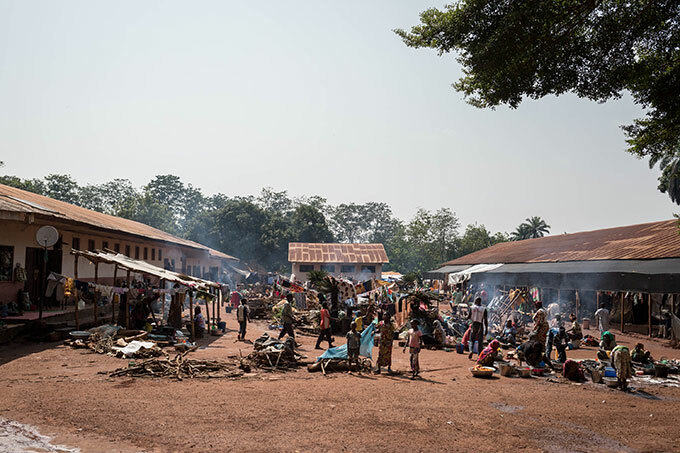'I was among the dead and injured': horror in C. Africa
"I was among the dead and injured", the 54-year-old Ngobo said.
A member of the Central African Red Cross, Jonas Ngobo, aged 54, rests on August 14, 2017, in the chapel Saint-Andre of Loungougba south-eastern Central African Republic, a village where he fled to from his town of Gambo. AFP Photo / Alexis Huguet
Jonas Ngobo can still clearly see the bloodshed and devastation left when rebels attacked a Red Cross health centre in the Central African Republic where he worked.
"I was among the dead and injured", the 54-year-old Ngobo said.
Six of his colleagues died in the violence in the southern town of Gambo, near the border with the Democratic Republic of Congo, when members of a group called the Union for Peace in Central Africa (UPC) invaded the facility.
The UPC is part of a Muslim-majority rebel coalition called the Seleka which briefly held power when it deposed President Francois Bozize in 2013 before they themselves were overthrown by a military intervention led by former colonial ruler France.
Those events sparked some of the bloodiest sectarian violence in the country's history as mainly Christian militias sought revenge.
Christians -- who account for about 80 percent of the population in the Central African Republic -- organised vigilante units dubbed "anti-balaka" (anti-machete), in reference to the machetes used by Seleka rebels.
"Everyone thought the hospital was a safe haven," Ngobo, who managed a wing in the hospital, said. "People crowded in thinking they were under the protection of the Red Cross."
"When they arrived, one of the Seleka took his knife to cut the Red Cross flag. With rifles, machetes and bows, they slaughtered people. They attacked on the inside, on the outside, inside every office. They broke all of the doors".
The August 5 attack in Gambo, which lies about 450 kilometres (280 miles) from capital Bangui, began around noon (1100 GMT), Ngobo said, when the Seleka invaded the town in the hopes of retaking it from anti-Balaka fighters.
"They kept going until 4pm before withdrawing. We found dead and injured people in town. By nightfall, the city was deserted. Everybody had fled to the forest," Ngobo said.
He was taken hostage by the rebels and forced to treat wounded fighters for about five hours before he was taken back to the hospital.
They "told me not to move," he said. "About 11pm, I fled into the forest, helping injured people flee to Bangassou" -- about 75 kilometres east.
Ngobo has since settled in Loungougba, about 50 kilometres from Gambo toward Bangassou.
"Some people took a week to get here and still some others are just now arriving," he said, adding that he believes 32 people died inside the hospital and in the town.
'Signs of genocide'
On the border with DR Congo, Bangassou and the surrounding region has in recent weeks become the epicentre of the unrest in the Central African Republic.
At least 60 people have been killed -- including the six Red Cross aid workers -- in fighting between armed groups in Ngaoundaye and Batangafo in the north, Kaga-Bandoro in the centre and Alindao and Gambo to the south, witnesses told AFP.
 People walk inside the displaced muslims refugee camp at Bangassou, south-eastern Central African Republic, some 470 km east of the capital Bangui on August 14, 2017.
People walk inside the displaced muslims refugee camp at Bangassou, south-eastern Central African Republic, some 470 km east of the capital Bangui on August 14, 2017.
Three Moroccan peacekeepers with the MINUSCA force were killed in an ambush there in July, while six others were killed in May.
Those crimes were committed by anti-Balaka fighters, the UN said.
Aid workers have also been targeted in the fighting, which could force them to withdraw from especially violent areas, aid groups said Tuesday in a letter to UN Secretary-General Antonio Guterres urging immediate action to stem the violence.
The groups said that at least 821 civilians have been killed this year, while some 180,000 people have been driven from their homes, bringing the total number of displaced in the Central African Republic to well over half a million, according to the UN.
UN aid chief Stephen O'Brien has warned that renewed clashes showed "early warning signs of genocide" and has also urged immediate action.
Pope Francis has called for an end to "all hate and violence" in the country as well.
The UN peacekeeping mission has 12,350 troops and police on the ground in the country to help protect civilians and support the government of President Faustin-Archange Touadera, who was elected last year.
'Why do they hate us?'
Soldiers from Morocco, Gabon and Bangladesh are stationed in the Bangassou area -- which is still controlled by pro-Christian militias -- where hundreds of Muslims have taken refuge inside a seminary.
They are afraid to leave.
"Why do they hate us? Why do they do this to us?" said Djamal Mahamat Salet, the son of the city's grand imam who was killed in May by anti-Balaka fighters. "Women are attacked, children are slaughtered".
The city is now virtually deserted, particularly the administrative sector, because of the thousands of people who have fled to neighbouring DR Congo.
According to Spanish priest Juan Jose Aguirre however, the markets are slowly coming back to life, though he crossed the southern border last week to deliver his homily to thousands of Central African refugees in DR Congo.
More than 10,000 people have arrived in the country since last week in the town of Yakoma, the UN aid agency said.